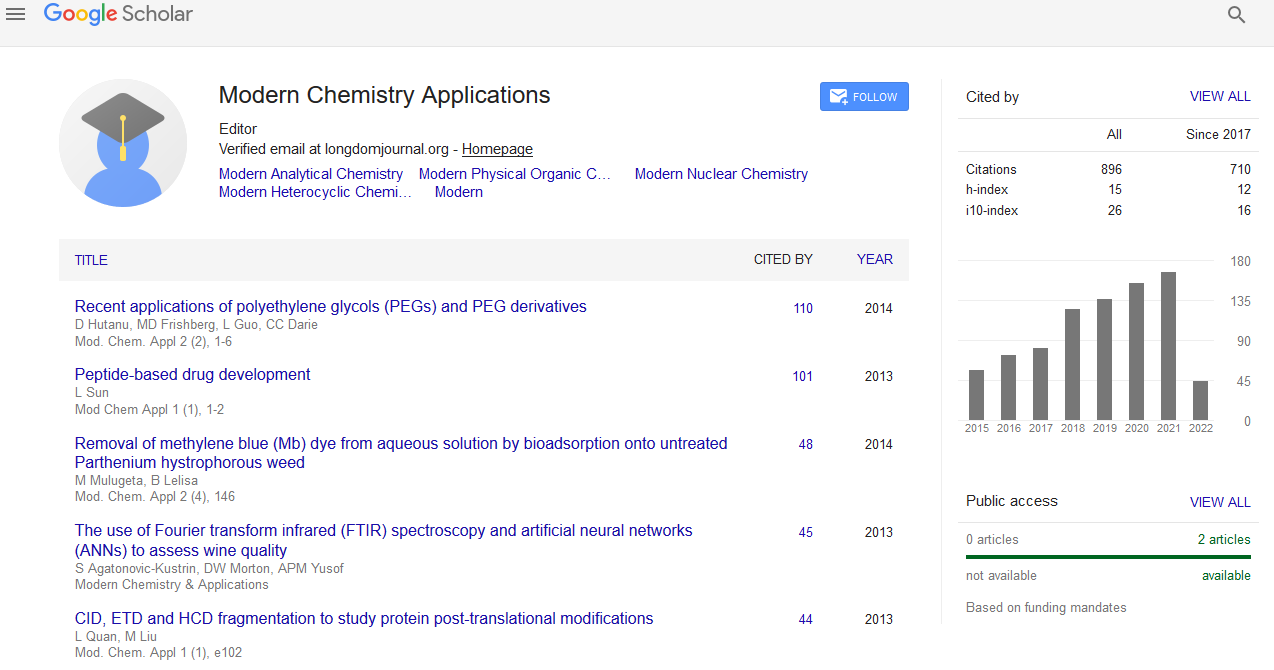Indexed In
- Open J Gate
- JournalTOCs
- RefSeek
- Hamdard University
- EBSCO A-Z
- OCLC- WorldCat
- Scholarsteer
- Publons
- Geneva Foundation for Medical Education and Research
- Google Scholar
Useful Links
Share This Page
Journal Flyer

Open Access Journals
- Agri and Aquaculture
- Biochemistry
- Bioinformatics & Systems Biology
- Business & Management
- Chemistry
- Clinical Sciences
- Engineering
- Food & Nutrition
- General Science
- Genetics & Molecular Biology
- Immunology & Microbiology
- Medical Sciences
- Neuroscience & Psychology
- Nursing & Health Care
- Pharmaceutical Sciences
Drug discovery of potential drug candidates from some Turkish medicinal plants
9th Global Chemistry Congress
July 23-24, 2018 | Lisbon, Portugal
Bilge Sener
Gazi University, Turkey
Keynote: Mod Chem Appl
Abstract:
Bioresources have tremendous potential in providing bioactive compounds for the development of new leads. There is a great scope for new drug candidates based on traditional medicinal plants throughout the world. Medicinal plants have an enormous potential for producing bioactive compounds of great benefit to mankind. The achievements in the field of science and technology were resulted in the isolation of pure compounds such as morphine, quinine, digoxin, atropine, ephedrine, reserpine, galanthamine and taxol were used in clinic. Some compounds like diosgenin can also be used to obtain steroidal compounds (cortisone, hormones) as starting compound. The number of drugs derived from medicinal plants that are recently introduced into clinical use is increasing. Besides, numerous of standardized herbal extracts were approved by the health authorities to be used in phytotherapy as phytomedicine. Turkey is one of the rich countries in terms of bioresources depends on different climates, geographical location, ecological factors and aquatic environments as well as the passageway between Europe, Asia and Africa. Therefore, the floristic diversity provides a wide choice of species represented 12.000 taxa of which 3700 is endemic. Turkey is a party to the Convention on Biological Diversity which states that participating countries have sovereign rights over their own bioresources. The drug discovery program from nature in our laboratory involves several steps from plant collection, extraction, HTS of the extracts by using in vitro enzyme inhibitory tests, bioassay- guided fractionation through the isolation, structure elucidation of bioactive compounds. We found diverse classes of compounds ranging from simple aromatics to complex molecules of alkaloids, terpenoids, steroids and phenylpropanoids showed significant biological activities including anticholinergic, anticholinesterase, anti-inflammatory, antimalarial, antituberculosis and antiprotozoal from Amaryllidaceae, Liliaceae, Iridaceae, Buxaceae, Fumariaceae and Taxaceae etc. The investigation of these sources requires multidisciplinary approach in the discovery and development process. In this presentation, selected Turkish medicinal plants that possess several bioactivities along with some drug candidates have been summarized.
Biography :
Bilge Şener has completed her graduation from Ankara University, Faculty of Pharmacy in 1974 as the First Degree. She has completed her PhD from the Turkish Scientific and Technological Research Council (TUBITAK) at the Department of Pharmacognosy in 1977. In 1981, she became an Associate Professor and was involved within the process of establishing Department of Pharmacognosy, Faculty of Pharmacy, Gazi University in 1982. She also involved in several administrative works at Gazi University; as Director at the Department of Pharmacognosy, Faculty of Pharmacy, Gazi University between 1982 and 2002, as Chair at Division of the Professional Sciences of Pharmacy, as Co-Director at the Institute of Health Sciences (1988-1994) and as Dean at the Faculty of Pharmacy, Gazi University (1994- 1997). She has won 21 awards from national and international institutions. She was given the degree of “Adjunct Professor” by University of Karachi –Pakistan. She has worked as Director in 48 projects supported by NATO, NSF, IUPAC, Soctrates-Grundtvig, TUBITAK and University Research Funds by now. She has authored or co-authored 12 books, 77 chapters and 351 research articles published in leading international journals. She has also given 68 conferences and 256 plenary and invited lectures at the international symposia in the field of Natural Product Chemistry. She has been working as full-time Professor at the Department of Pharmacognosy, Faculty of Pharmacy, Gazi University.
E-mail: bilgesener11@gmail.com


